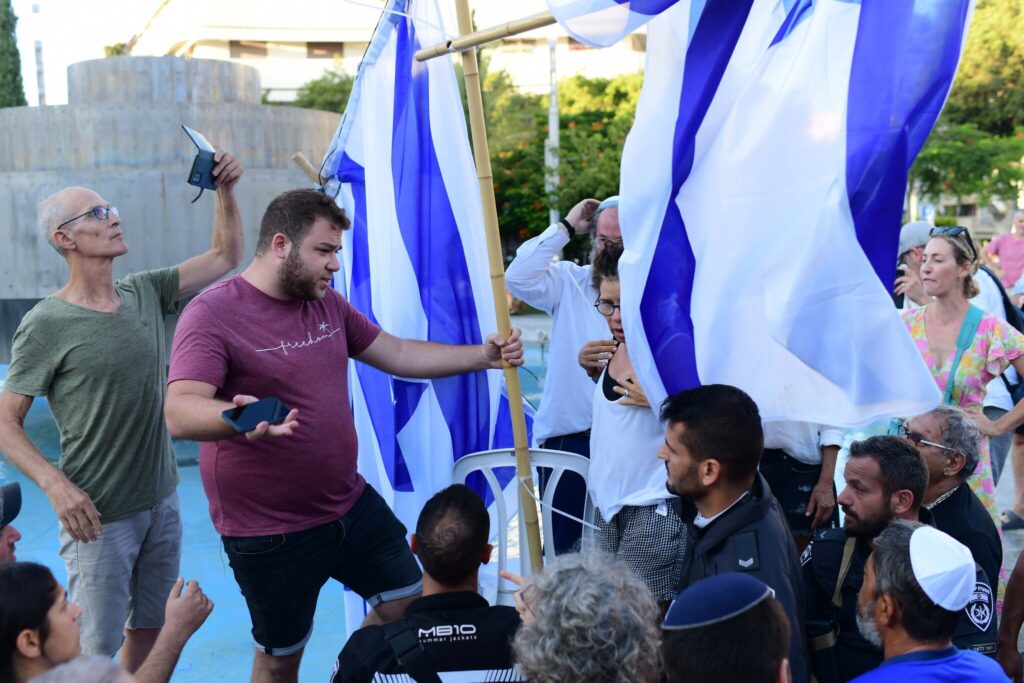The demonstrators, slammed by Netanyahu as “left-wing rioters,” were protesting gender segregation in public Yom Kippur services.
By Meir Dolev, World Israel News
Tensions ran high in Tel Aviv and other parts of Israel as Yom Kippur services were marred by fighting between congregants and demonstrators, who were ostensibly protesting gender segregation in a public space which they claimed violated a recent ruling by the High Court.
Controversy had been brewing in the lead-up to the holiday, after the Tel Aviv municipality issued a ban on a segregated service by the religious Rosh Yehudi group, which for a number of years has held Yom Kippur services in Dizengoff Square. The services, which take place at the commencement of the fast for the Kol Nidre prayers and at its end for the final Neilah prayer, typically draw more than 2,000 people, most of whom are secular.
Rosh Yehudi sought legal intervention to overturn the ban, but their petitions were ultimately dismissed by both local courts and the High Court on appeal.
In an attempt to adhere to Jewish law, the group put up a makeshift separation barrier between the women’s seating and that of the men, known in Hebrew as a mechitzah. The mechitzah consisted of a rod with Israeli flags draped over it – an apparent attempt to appease opponents of the move. Ironically, the Israeli flag has become the symbol of the protest movement.
On Yom Kippur, the Day of Atonement which is the holiest day on the Jewish calendar, Israel observes a 25-hour period of reflection, fasting, and prayer, with driving prohibited and streets lying empty, as Israelis connect with their cultural roots and seek forgiveness. Despite it being a religious holiday, most secular Israelis observe it in some form. In the case of Rosh Yehudi’s mass service in Dizengoff, people who would otherwise not step into a synagogue welcome the public services, including beach-goers and surfers who often join the prayers in swimwear and carrying surfboards, and a large number of members of Tel Aviv’s LGBTQ community.
Protesters shouted chants of “shame!” and even “Nazis!” at worshipers and ripped down the mechitzah. They were also heard saying, “God will not forgive you for breaking the law.” There were multiple references to the government and its plans for judicial reform.
Similar protests occurred in other gender segregated services in Jaffa, Haifa, Zichron Yaakov and elsewhere in Tel Aviv. According to Tel Aviv deputy mayor Chaim Goren, who is religious, protesters were even disrupting services where there was no mechitzah and no gender segregation.
In Jaffa, the rabbi of a local yeshiva that held services outdoors, Rabbi Eliyahu Mali, encouraged his students not to react to the protesters, who purposely planted themselves inside the seating areas of the opposite sex and made enough noise to drown out the cantor. One woman who was filming with her phone ran up to the cantor and banged on the table while yelling chants. As a result of the rabble-rousing, Rabbi Mali decided that the Neilah prayer would not take place outdoors as planned, but would be held inside the yeshiva. Just before the prayers were due to commence, Rabbi Mali addressed the congregants and said that Yom Kippur was a day for complete compassion, even for the protesters. In that spirit, he called for a special prayer to be said on behalf of the protesters, who, he said, “couldn’t or were not willing to pray.” The students and the rest of the congregation said Psalms in honor of the protesters.
In the aftermath of the Yom Kippur incidents, Prime Minister Benjamin Netanyahu lambasted the protestors, stating, “To our surprise, in the Jewish nation, on the holiest Jewish day, left-wing protestors rioted against Jews as they prayed. It seems that there are no limits, no norms, and there is no exception for hate from the left-wing extremists. I, like most of Israel’s citizens, reject this. There is no room for such violence between us.”
Tel Aviv Mayor Ron Huldai took a firm stance, vowing to maintain the “inclusive nature of the city” and warning against any attempts to flout municipal regulations and law. “In Tel Aviv, there is no place for gender segregation in the public sphere,” he declared.
Critics have slammed Huldai for appealing to his base a month ahead of municipal elections and preaching pluralism while actively torpedoing any attempts at religious inclusivity.


